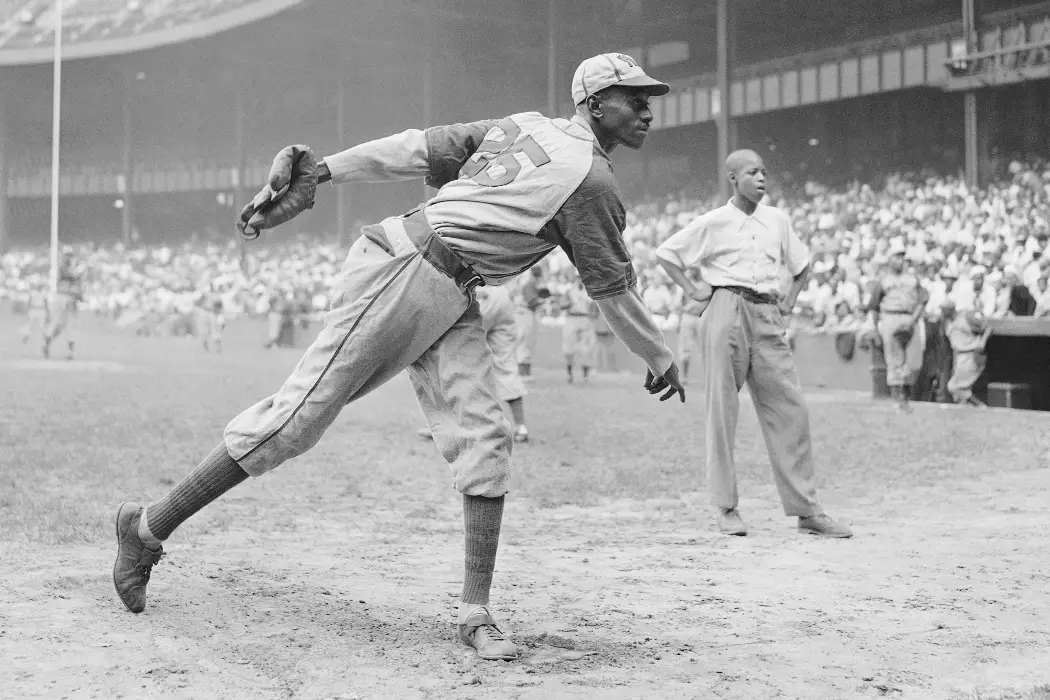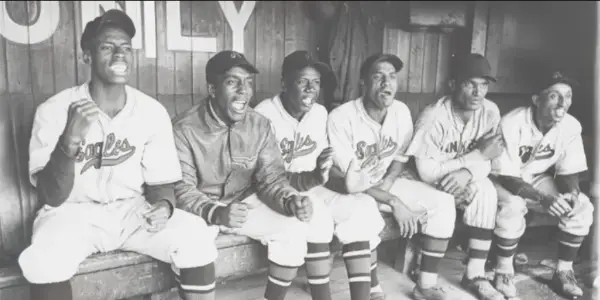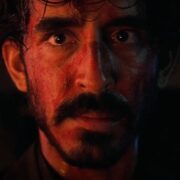THE LEAGUE: Celebrating The History Of Black Baseball

Tynan loves nagging all his friends to watch classic movies…
If you were a little kid like me who grew up loving baseball and was quick to idolize Jackie Robinson, you learn so quickly that he was connected to an ecosystem of other players around him. There were contemporaries like Larry Doby, and successors like Hank Aaron, Willie Mays, and Ernie Banks. Then, eventually, you get back to where he came from.
The Negro Leagues, as they were called in their day, spawned Robinson and birthed some of baseball’s most mythic heroes like Satchel Paige, Josh Gibson, and Cool Papa Bell. Before I ever knew about jazz music or the Harlem Renaissance, The Negro Leagues was a part of my youthful consciousness as a rich lineage and source of Black culture.
If it wasn’t quite spelled out for me, I knew intuitively that there was something wrong with these parallel worlds of White and Black — the color barrier that Robinson ultimately shattered (with Doby) in 1947. But the grievous history and the reality of this segregation should not obfuscate the fact that such a rich source of entertainment was created within the Black community, to begin with.
The year I visited the Baseball Hall of Fame in Cooperstown, pitcher Hilton Smith of the Kansas City Monarchs was one of the inductees, and later, I remember understanding what a coup it was when executive Effa Manley along with a whole host of others were inducted into the Hall in 2006. As a student of baseball from an early age, it was apparent that there was a complicated dichotomy within the game I loved, and it reflected America’s societal wounds.
Director Sam Pollard does us all a service by delving deeper into the history of this league that stood on its own two feet in the face of segregation.
League History
The League provides some much-needed context acting as a reminder of the conflicted roots within our nation, and it weaves the narrative together with the help of characters of all colors and stripes.
I was aware of Cap Anson as a young kid; he was one of the hallowed few inducted into the Baseball Hall of Fame in 1939 during the first induction. Cap Anson also would not deign to play in any ballgame with Black players on an opposing team.
Moses Fleetwood Walker is credited as the first black man to play Major League Baseball generations before Jackie Robinson. However, over time, segregation set in and became solidified as the league consolidated itself. Meanwhile, the legal status quo, as represented by Plessy v. Ferguson (1896), of separate but equal was instilled across all sectors of society. That included baseball.

Rube Foster stands out as not only a phenomenal player-manager but a visionary and a mobilizer of men spearheading the Negro Leagues in the 1920s and its exciting style of play. Effa Manley was another pioneer — known as the First Lady of Black Baseball — she was an executive for the Newark Eagles and the only woman inducted into the Baseball Hall of Fame to this day.
The documentary traces how playing in the Caribbean was a kind of revelation for Black ballplayers because they were treated much better and felt much more at ease outside their own country. The cross-pollination was evident with men like Martin Dihigo, José Mendez, and Cristóbal Torriente coming to play in the States.
Judge Kennesaw Mountain Landis, baseball’s first commissioner, effectively maintained the status quo of segregation, and so his death in 1944 allowed for the loosening of restrictions. Before that, the only opportunities for Blacks to play against White players were during barnstorming exhibitions against players like Dizzy Dean.
If you’ve been tracking so far, all roads lead to Jackie Robinson, the man who changed baseball, changed people, and changed America. In that pressure cooker of a first season, he was still rookie of the year and helped the Dodgers win the pennant! One talking head considers it to be the most incredible, courageous feet in the history of competitive sports. It would sound like hyperbole if it didn’t have the ring of truth though I’m admittedly a little biased.
A More Nuanced Narrative
There’s a lot of lore about Branch Rickey‘s “Noble Experiment” to sign Robinson and break the color barrier in professional sports. But it wasn’t simply a mission of mercy as the narrative is a bit more complicated. Being a shrewd businessman, Rickey was looking for a competitive edge and obviously, the Negro Leagues had untapped potential.
However, when doing business with these Black teams, he didn’t consider them a part of a real league and thus didn’t pay for their players’ contracts. The irony becomes painfully apparent. Integration was happening thanks to Robinson, Roy Campanella, and Don Newcombe, and ultimately it was also going to kill Black businesses.
By one account Effa Manley tried to deal unsuccessfully with Branch Rickey, and it was ultimately the marketing pioneer and owner Bill Veeck who paid her for Larry Doby. It was a paltry $10,000, but it was something. Simultaneously the narrative that Jackie Robinson opened the league up for other Black talent is true, but only to a point. The average Negro League ballplayer still tragically lacked ample opportunities to get into the Major Leagues.
Conclusion: The League
All I can do is go back to my youth the first time I ever walked among the bronze statues of all the greats on the field inside The Negro League Baseball Museum in Kansas City, Missouri. I might be among the minority, but as a little boy names like Satchel Paige, Josh Gibson, and especially Jackie Robinson had a cultural cachet on par with white stars. I thank my father for instilling this veneration in me even to this day.
I’m hopeful that this documentary will open a whole world up to others who never had much interest in America’s Pastime. The gift of the film is how young and old, well-versed and newcomers alike can learn a great deal and earn a greater appreciation for our shared heritage.
Because I believe baseball holds a mirror to where our society has been and where it went across the expanse of the 20th century. The League is a crucial part of this story. It needs no qualifier. It was a showcase of great improvisations in the rich and beautiful game — a source of pride and enjoyment for an entire community. Now we get to be a part of it and appreciate it.
I’m still so glad the great raconteuring Negro League ambassador Buck O’Neil was elected to the Hall of Fame in 2022. He was one of my first introductions to this world, and he helped to keep its history alive. We would do well to follow in his footsteps and the work continued by this documentary.
The League was initially released on July 7, 2023, in the United States.
Does content like this matter to you?
Become a Member and support film journalism. Unlock access to all of Film Inquiry`s great articles. Join a community of like-minded readers who are passionate about cinema - get access to our private members Network, give back to independent filmmakers, and more.
Tynan loves nagging all his friends to watch classic movies with him. Follow his frequent musings at Film Inquiry and on his blog 4 Star Films. Soli Deo Gloria.













